[ad_1]
Michael John Ashcroft ROI MAFA (b 1969), grew up in a small village called Croston in the heart of Lancashire. After leaving school in 1985 he began his career as an engineer, painting and sketching only in his spare time. In 1998 he had a major operation to remove a brain tumour and decided to paint more seriously.
Fresh from a Northern Boy’s trip to the Lake District, we caught up with local lad Michael. We spoke with him to find out more about his career to date, his working methods and what inspires him.
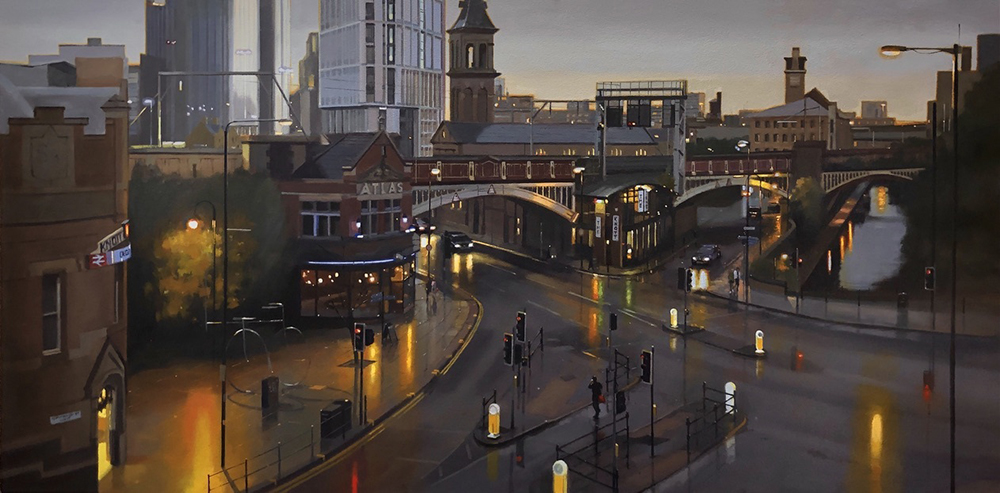
Tell us about how you started painting.
With an interest in art from an early age I tried many different art techniques. I was fascinated by animation in particular. I used to watch and draw cartoons and learn how the shapes, shadows and colours would connect to create a pleasing image. Cartoons and the artists that worked on them taught me a lot about juxtaposition and abstract quality.
I did try to find a college course in animation when I left school in 1985. If I recall they were few and far between and so it didn’t materialize. I remember watching another local lad called Nick Park doing something called Creature Comforts and thinking that’s brilliant, I thought, he will go far, not sure what happened to him!!! I decided to take a job as an engineer while I deliberated what to do, little did I realise it would last 20 years. But I never gave up on my dream of being an artist.
What was the turning point that made you become a full time artist?
Skip forward to 1998 and after being diagnosed with a brain tumour which was successfully removed at Manchester Royal Infirmary, I had managed a short walk to the window overlooking Nelson Street and saw my reflection in the window. My head was shaved from the centre down my left side completely and I had a large scar all the way down to my Adams apple. It was a life changing moment for me, I said to my reflection I am going to be an artist.
After a long recovery I started to paint again leaning more towards oils in particular. I started Life Drawing classes on a weekly basis. I read and studied artists trying to emulate their brush marks and mix different colours and tones. In short I was hooked and I never looked back.
Who has influenced your work?
In the beginning I was influenced a lot by Edward Hopper and one of my favourite paintings was ‘Night Hawks’. Lucian Freud was also fascinating to me. I would always visit his self-portrait in the Whitworth Gallery whenever I was at the hospital for a check-up. I was also heavily influenced by John Constable after seeing his jaw dropping Oil sketches in the V&A. These sketches prompted me to start painting en plein air.
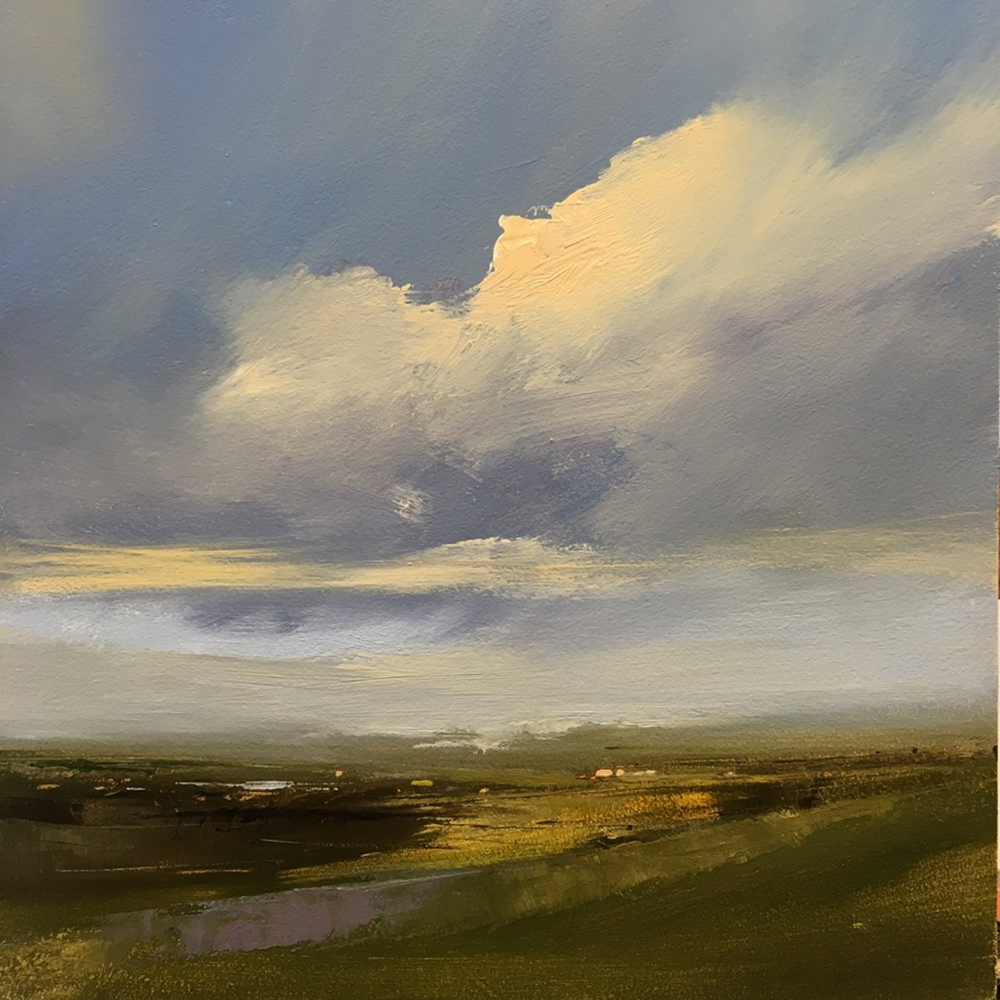
You work in oils, what excites you about oil painting?
Oils are such a lovely medium to work in. Spread it like butter with a palette knife or thin it down with turpentine to create a wash. Wipe it off or even put it on with a rag. Change things with ease, so long as you follow the fat over lean advice you can’t go wrong.
What is it that inspires you to paint a particular cityscape or rural scene?
My inspiration comes from many angles. I was always fascinated by lights and cities as a young lad and so I’ve always been drawn to that. In contrast to the city, I also had a love for Landscape paintings. I always try to carry a camera and sketch book so that whenever I see something that excites me I can record it. The inspiration usually comes in the form of a chink of light on the side of a building or a cool shadow lying on a warm hillside. I always used to head out in the early days trying to capture that magic 30 minutes when the light is dipping and the streetlights are coming on or the sun is just about to disappear, it truly is a magical time.
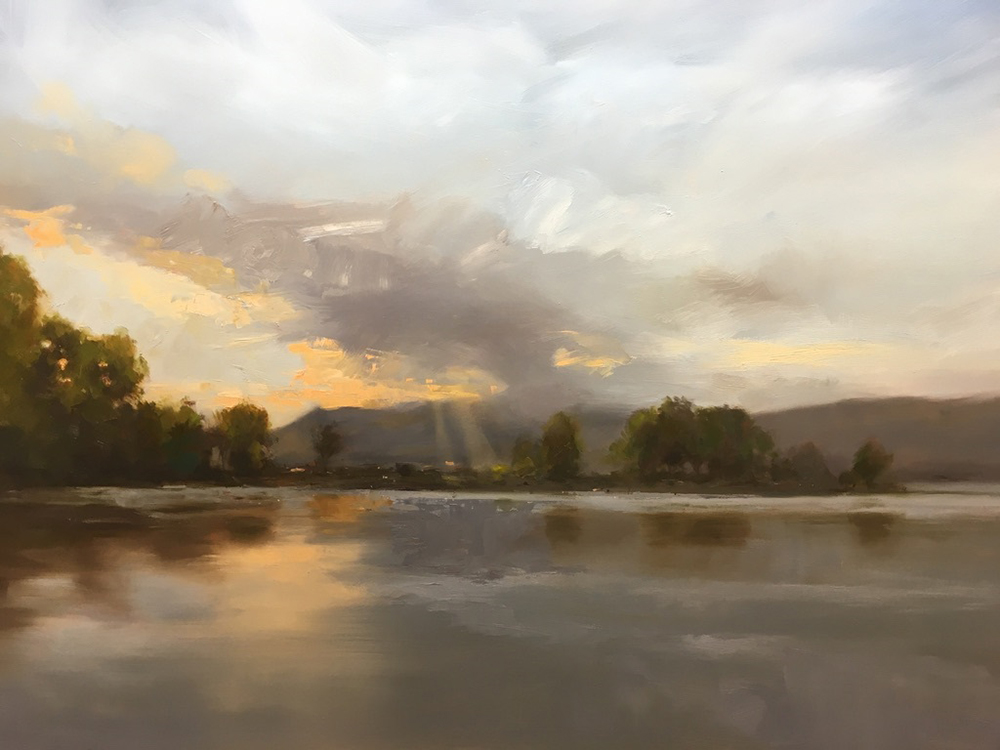
How do you begin your painting? Do you have a set method or does your technique vary from painting to painting?
How I start a painting can all depend on what mood I’m in. I have tried to pin a process down over the years as it would make life a lot easier but it’s kind of a mish mash of different techniques I’ve learnt over the years.
Sometimes I will put a turpsy wash of raw umber on and block in shapes and then draw over the top with paint. Occasionally if I am feeling confident, I will go straight in with the drawing. Sometimes I work on an orange or red ground and sometimes I work on a white board or even canvas.
It takes years of doing it to realise what works for you but even then, you can change at the drop of a hat. There really are no fixed rules and neither should there be. So long as you connected with the subject in front of you then you will find your own way.
Can you talk us through your thought process or story behind one of your pieces of art?
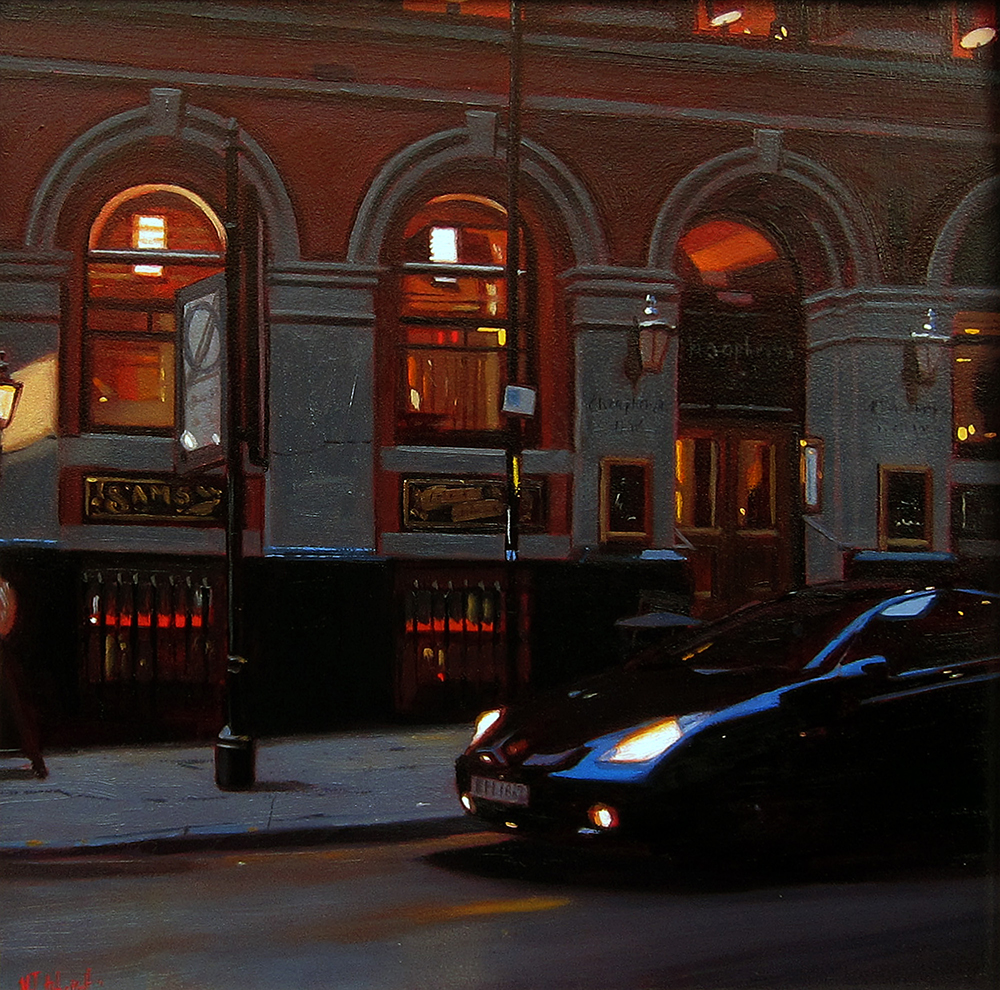
I have chosen this painting to talk about, it’s called Dressed in Black and it was a studio painting. I had started to want to paint the Pubs of Manchester, and this was one of my first choices as it was a favourite bar of mine. Sam’s Chop House owned by Roger Ward might be familiar to people as it has Mr LS Lowry bronze statue sat at the bar.
I knew the pub quite well but was wondering which angle to paint it from. Camera and sketch book in hand I waited around for the light to dip, the magic half an hour. I was finding it quite tricky to get a good take on it, I wasn’t as quick back then to spot good compositions. But then this car rolled up in front of me and I thought that’s rude! Then I saw it, the car brought some narrative to the piece, who was in it, what were they doing, all of a sudden I couldn’t wait to get it down on paint.
As this was a studio painting, I got the images back and choose the right one. I wanted a square format as I wanted it to have a contemporary feel, I changed the car colour to Black and got rid of all the detail to make it look slick.
As I finished the painting the title popped in my head, ‘Dressed in Black’ and there it was framed and finished. A good friend of mine bought that one so I can see it whenever I want which is fantastic.
Which painting of yours are you most proud of, or consider a particular favourite and why?
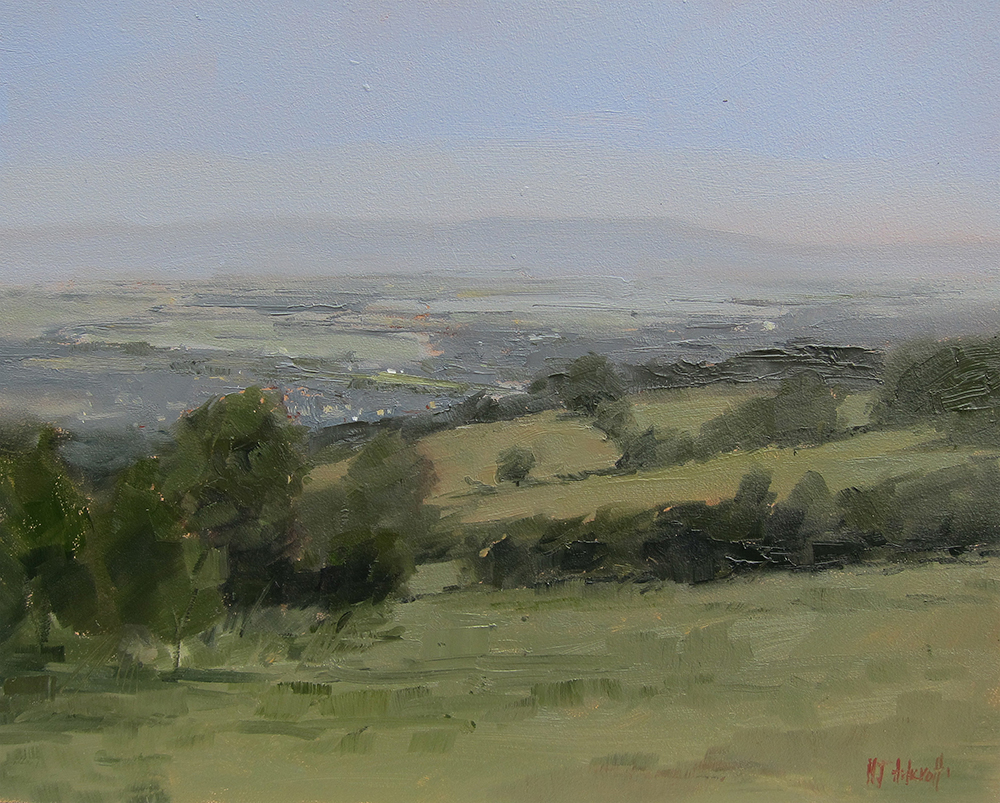
Choosing a painting I am most proud of is like trying to choose one of your children. There are lots of paintings I like for different reasons, it might have been how I felt on the day, if I was listening to a certain song or if the painting was working and I couldn’t put a wrong mark on.
If one painting comes to mind I guess it would have to be the ‘A Summers Day, Broadway’ 8” x 10” oil on board. I had decided to go over to Broadway in the Cotswolds and do some painting. Recently accepted in a gallery there my Mum and Dad had kindly offered to put me up as they were visiting the village on holiday. Rising early I took my pochade and paints up the hill towards Broadway Tower to find a spot. Nothing really jumped out at me except this view which wasn’t really of anything other than a beautiful vista with lots of greens but I did like it.
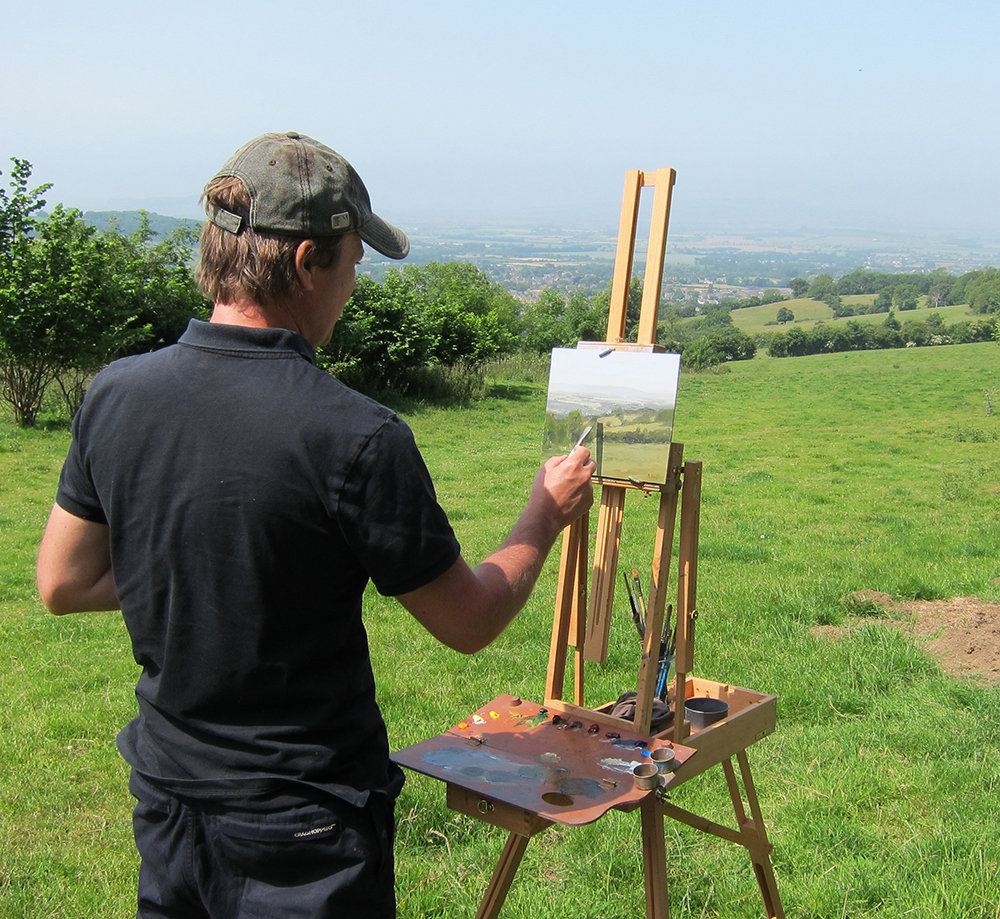
I set up reminding myself to just enjoy the painting, treat it like a study and don’t get too precious over it. I started the piece and within 20 mins I felt I was onto something. It was the first time I had ever had butterflies in my stomach thinking don’t mess this up!! Everything I had tried to learn about, colour, tone, composition just came together in that one moment. As I was about an hour or so in my Mum rolled up with a cheese sandwich for my lunch and I could barely speak as I was concentrating so hard on finishing it.
It might not look like a showstopper painting but to me it was a moment in time when I was in the zone, and it just clicked. Needless to say, it was the first painting to sell at the Biscuit Factory Exhibition and yes I wish I had kept that one for myself!!!
Manchester is often depicted in your paintings, and in your book ‘Painting Manchester’s Pubs’. What draws you to paint this city?
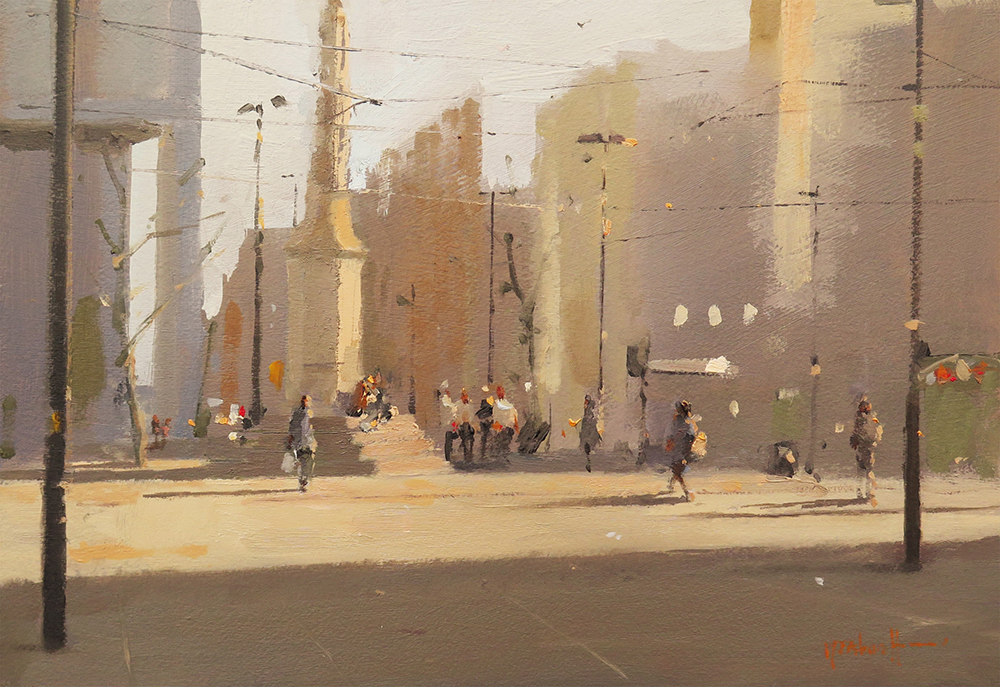
I had a strong connection with Manchester after having all my hospital treatments there. I was diagnosed with a rare Genetic disorder that creates multiple tumours in the body. As a result I have been back and forward to the city for years to have tumours removed, radiotherapy and appointments. I would always visit the hospital but then I would always end the day with a visit to the Manchester Art Gallery or the Whitworth Gallery and then maybe a pint.
I have grown to love this great city and the architecture, people and general city life never fails to inspire me. It is a dream come true to be showing my work in Contemporary Six.
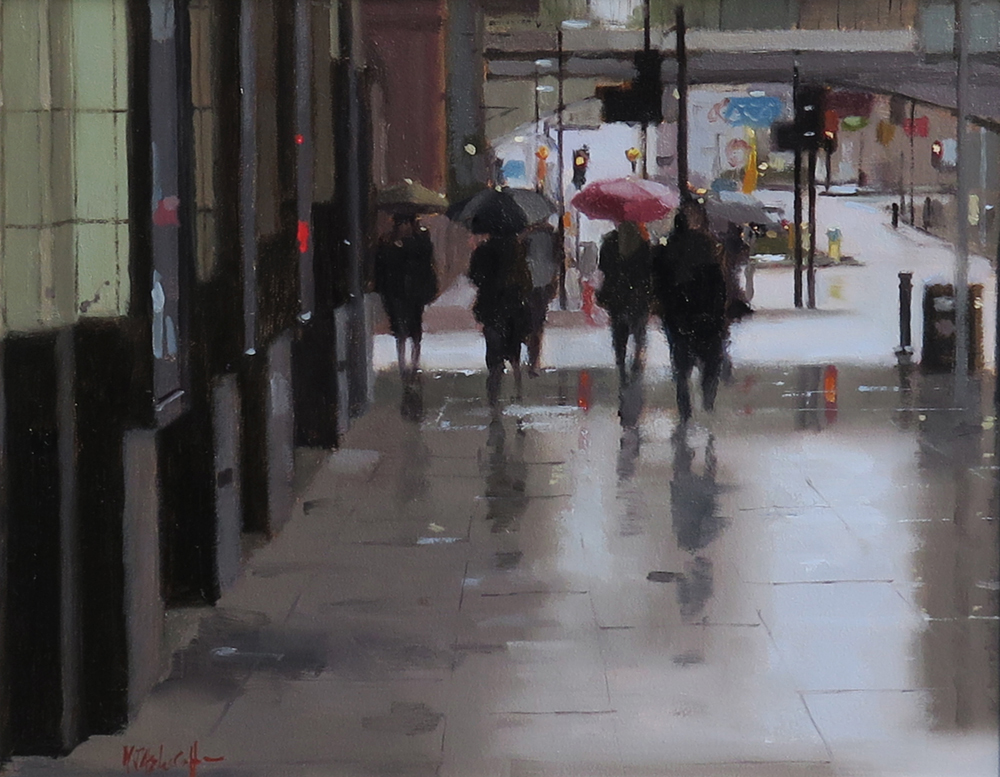
What is a day in the life of a professional artist actually like?
| 8.00 am | I get up for breakfast, usually porridge and a banana. |
| 9.00 am | Radio on and I am in the studio. I will work on what I have left on the easel from the night before or I will start a new painting. |
| 12.00pm | I come in for my lunch and catch up with a Netflix series or whatever I am watching at the moment. Generally just to switch off from the work for an hour. |
| 12.45pm | I get back to the studio and put on music or a podcast. |
| 4.30 pm | I am running out of steam! I will start thinking about packing up for the day, but there have been plenty of times when I have gone into the night. |
| 5.00 pm | Paper work or emailing and generally catching up with stuff. |
And yes of course all this goes out the window when I go outdoor painting or on trips. But in general, that’s how my studio day works, I guess it comes from my engineering days from having to clock on and off.
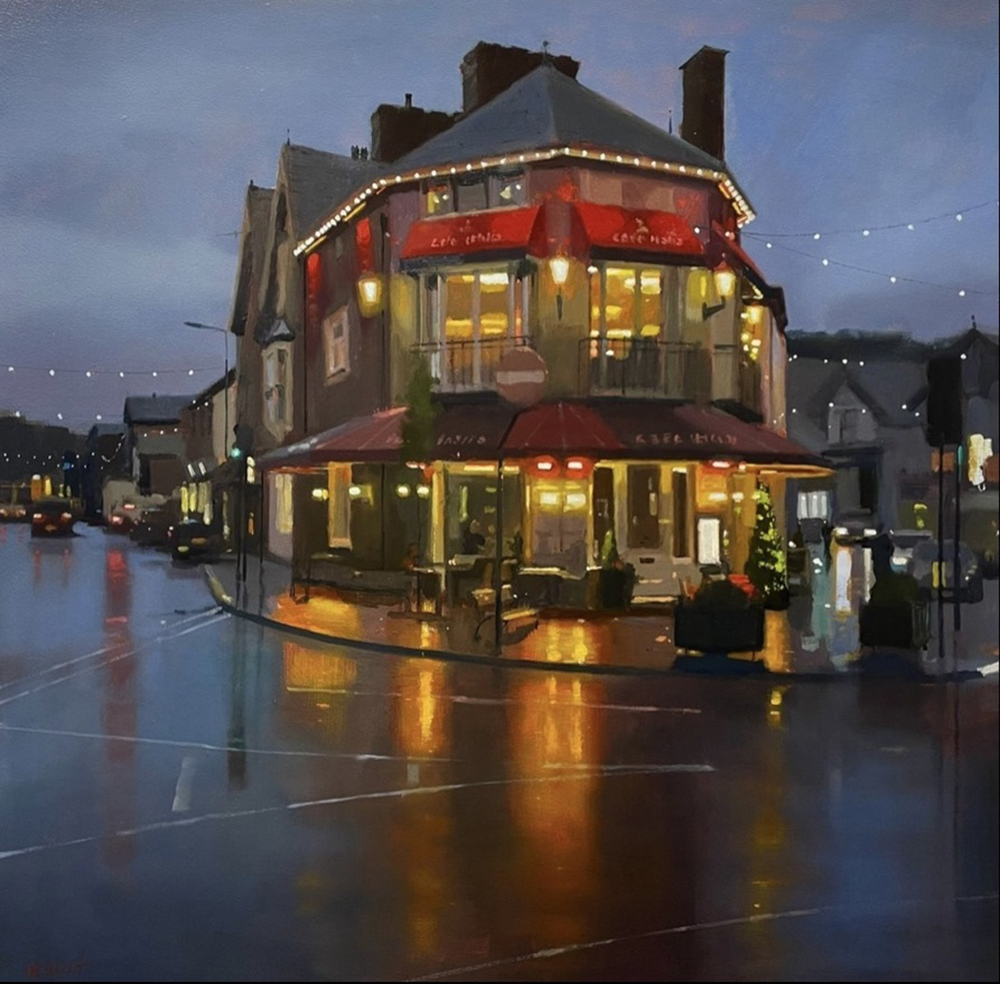
What advice would you give to an aspiring artist?
My advice to any aspiring artist is to immerse yourself in the art world. Read art books on different artists that you’re interested in. Learn about techniques and how others work. Visit lots of galleries and exhibitions seeing how the shows are presented and how the works are executed. Talk to like-minded artists and join a drawing or art club. Being with other artists is very inspirational and you bounce ideas off each other. Most of all enjoy it, be true to yourself and the rewards will follow.
Where can we see your work in real life?
See my work in many locations including,
Michael is a member of the Royal Institute of Oil Painters and Manchester Academy of Fine Arts. He has exhibited in The Royal Institute of Oil Painters, Royal Society of British Artists, The New English Art Club, The Howard De Walden Exhibition and The Royal Academy Summer Exhibition in London. He has won numerous awards during his career, most recently the winner of the Alan Gourley Memorial Award 2020.
Visit Michael’s website and keep up-to-date with him on Instagram
Michael is part of the Northern Boy’s, a distinguished outdoor painting group, watch a film about them here:
[ad_2]
Source link
